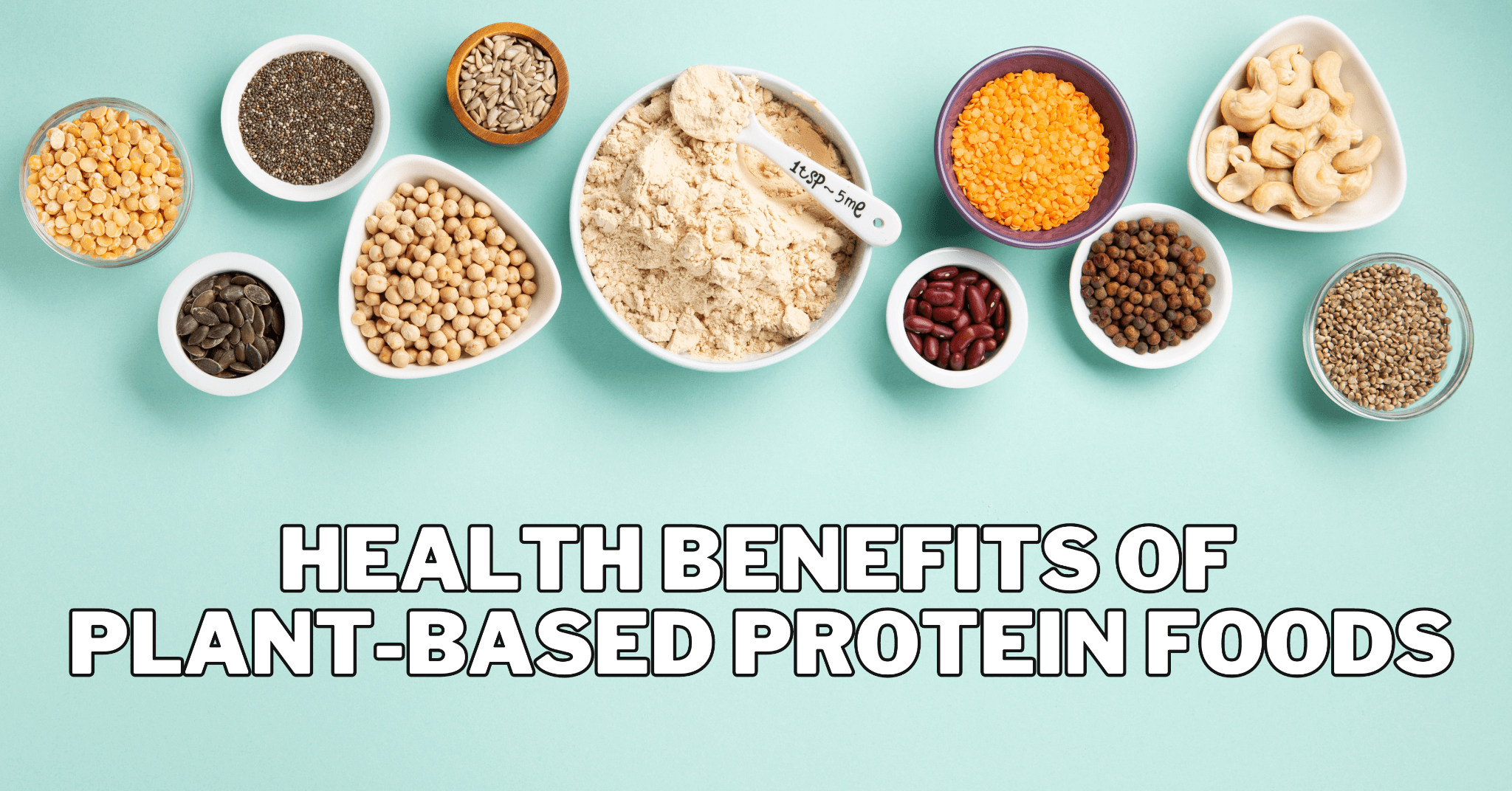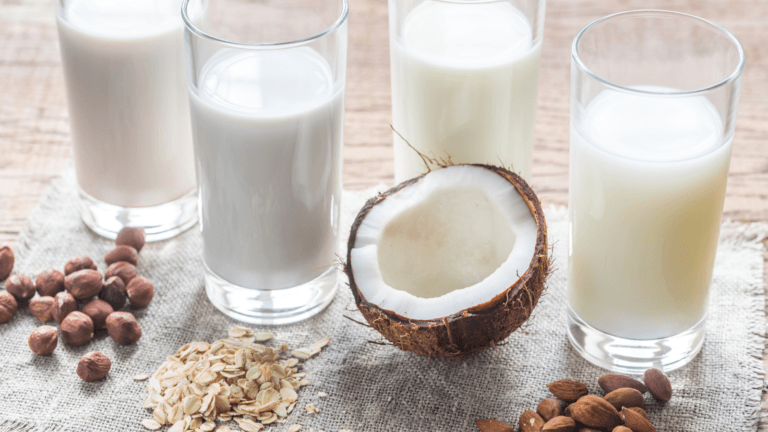Health Benefits Of Plant-Based Protein Foods
Health Benefits Of Plant-Based Protein Foods
Plant-based protein foods have gained popularity in recent years as more people embrace a healthier and more sustainable lifestyle.
These protein-rich alternatives derived from plant sources offer many health benefits, making them an excellent choice for individuals looking to enhance their diet with nutritious and delicious options.
This article will explore the benefits of incorporating plant-based protein foods into your meals.
From supporting heart health to promoting better digestion and weight management, plant-based proteins offer much for vegetarians and non-vegetarians.
Whether you are seeking to reduce your meat consumption or simply diversify your protein sources, the world of plant-based protein foods is brimming with exciting options that will nourish your body and contribute to a more sustainable and ethical way of eating.
Let's delve into the details and uncover how plant-based proteins can benefit your well-balanced diet.

What Are Plant-Based Protein Foods?
Plant-based protein foods refer to diverse dietary choices that derive their protein content primarily from plant sources rather than animal-based products.
These foods offer an array of nutritious alternatives to traditional animal protein sources like meat, dairy, and eggs.
Plant-based protein sources include legumes like lentils, chickpeas, and black beans, which are rich in protein, fiber, and essential minerals.
Nuts and seeds, such as almonds, chia seeds, and pumpkin seeds, also boast considerable protein content alongside healthy fats and micronutrients.
Additionally, whole grains like quinoa, brown rice, and oats contribute to the plant-based protein arsenal, providing protein, complex carbohydrates, and various vitamins.
Tofu, tempeh, and edamame are flexible and comprehensive plant-based protein sources.
Moreover, certain vegetables like spinach, broccoli, and Brussels sprouts offer surprising amounts of protein while delivering essential vitamins and antioxidants.
Plant-based protein foods are often celebrated for their lower saturated fat content and absence of cholesterol, which can benefit heart health and overall well-being.
Furthermore, these protein alternatives are typically more environmentally sustainable and require fewer natural resources than traditional animal-based sources, making them an appealing option for environmentally conscious individuals.
By incorporating various plant-based protein foods into their diet, individuals can enjoy a broad spectrum of nutrients while supporting a healthier lifestyle and conserving the planet's resources.
Health Benefits Of Plant-Based Protein Foods
In a world where health-consciousness and environmental sustainability are at the forefront of dietary choices, plant-based protein foods have emerged as a compelling and compassionate option.
Plant-based protein foods offer many health benefits that make them valuable to any diet. Here are some of the key health advantages of incorporating these protein-rich alternatives into your meals:

1. Improved Heart Health
Plant-based protein diets are essential for promoting heart health due to their naturally low amounts of saturated fat and lack of cholesterol.
Saturated fat and cholesterol-rich diets have been associated with a higher risk of heart disease, the leading cause of death worldwide.
By choosing plant-based protein sources like legumes, nuts, seeds, and whole grains, individuals can significantly reduce their saturated fat and cholesterol intake, thus supporting cardiovascular well-being.
Additionally, plant-based proteins frequently contain large amounts of dietary fiber, which helps keep blood pressure levels in a healthy range and lowers the chance of developing hypertension.
There is evidence that some plant-based proteins, such as soy, have a good effect on blood lipid profiles by reducing dangerous LDL cholesterol levels while raising healthy HDL cholesterol levels.
Moreover, antioxidants and anti-inflammatory compounds in plant-based foods further contribute to heart health by reducing oxidative stress and inflammation in the arteries.
Overall, embracing a diet rich in plant-based protein nourishes the body and nurtures a healthier heart and a more resilient cardiovascular system.

2. Weight Management
Plant-based proteins offer a valuable advantage in weight management due to their unique nutritional composition.
Unlike animal-based proteins that can be higher in calories and saturated fats, plant-based proteins tend to be more nutrient-dense while being lower in overall calories.
Additionally, many plant-based protein sources are rich in dietary fiber, promoting feelings of fullness and satiety.
Meals containing plant-based proteins can keep you fuller for longer periods because fiber slows digestion, which lessens the temptation to snack or overeat.
Plant-based protein foods are a great alternative for those seeking to maintain a healthy weight or support weight loss due to reduced calorie density and higher fiber content.
Furthermore, incorporating various plant-based protein sources into your diet ensures a diverse array of essential nutrients contributing to overall well-being.
By opting for plant-based proteins, individuals can enjoy delicious and filling meals that provide all the necessary building blocks for a balanced diet while aiding in weight management goals.
Ultimately, embracing plant-based protein foods presents an empowering approach to maintaining a healthy weight and promoting a positive relationship with food.

3. Lower Risk Of Gastrointestinal Disorders
Embracing a plant-based diet is associated with a diminished risk of gastrointestinal disorders, including conditions like diverticulitis and irritable bowel syndrome (IBS).
This health benefit can be attributed to the abundant fibre found in plant foods. Fiber is crucial in maintaining digestive health by promoting regular bowel movements and preventing constipation.
Additionally, the soluble fibre in plant-based diets serves as a prebiotic, nourishing beneficial gut bacteria and fostering a balanced microbiome.
By opting for plant-based proteins, individuals contribute to a digestive environment that supports overall gastrointestinal wellness, reducing the likelihood of these specific disorders.

4. Reduced Risk Of Antibiotic Resistance
Selecting plant-based protein sources offers a proactive stance against antibiotic resistance, a burgeoning public health concern.
In contrast to certain animal farming methods where antibiotics are routinely administered, plant-based protein production generally abstains from such practices.
This deliberate avoidance contributes to a lower risk of antibiotic residues in food and mitigates the development of antibiotic-resistant strains of bacteria.
By embracing plant-based options, individuals prioritize their health and partake in a sustainable and responsible approach to food consumption, promoting a collective effort to address the global challenge of antibiotic resistance.

5. Reduced Cancer Risk
According to various studies, plant-based protein foods have shown promising potential in reducing the risk of certain types of cancer.
Antioxidants and phytochemicals in plant-based foods are believed to contribute to this protective effect.
Antioxidants prevent oxidative damage to cells and DNA, a major contributor to cancer development, by scavenging the body's dangerous free radicals.
Additionally, phytochemicals like polyphenols and flavonoids, present in proteins derived from plants, have proven to have anti-cancer capabilities by preventing the growth and division of cancer cells.
Additionally, plant-based diets often contain lower levels of processed and red meats, linked to an increased risk of certain cancers.
While more research is needed to fully understand the intricate relationship between plant-based proteins and cancer prevention, the existing evidence points towards the potential benefits of incorporating these foods into one's diet to support overall health and reduce cancer risk.
Adopting a diet that centers around plant-based proteins provides ample nutritional benefits and presents a proactive approach to promoting wellness and safeguarding against chronic diseases like cancer.

6. Blood Sugar Regulation
Plant-based proteins offer a favourable advantage in blood sugar regulation, particularly for individuals with diabetes or those aiming to manage their blood sugar levels.
Whole grains and legumes, common sources of plant-based proteins, have a lower glycemic index than many animal-based proteins and refined carbohydrates.
How quickly a food elevates blood sugar levels after the glycemic index measures ingestion.
Foods with a lower glycemic index raise blood sugar gradually and steadily, which is advantageous for avoiding sharp spikes and crashes.
People can enjoy meals that promote stable blood sugar levels throughout the day by selecting plant-based proteins, lowering their risk of hyperglycemia, and assisting with diabetes control.
Additionally, the high fiber content found in plant-based proteins further aids in blood sugar control.
Fibre promotes a more gradual and regulated increase in blood glucose levels by slowing down the absorption of sugar into the bloodstream.
As a result, incorporating a variety of plant-based proteins into the diet can contribute to improved blood sugar regulation and provide a valuable tool for individuals seeking to optimize their metabolic health.

7. Improved Nutrient Intake
Plant-based protein foods offer many essential nutrients that contribute to improved overall health and well-being.
Unlike some animal-based proteins that may be higher in saturated fat and cholesterol, plant-based protein sources are generally lower in unhealthy fats and free from cholesterol.
Instead, they are abundant in vitamins, minerals, and antioxidants vital for various bodily functions.
Magnesium, vitamin E, and heart-healthy fats found in nuts and seeds are all important for maintaining a healthy heart and brain.
Important dietary fiber, B vitamins, and trace elements like zinc and selenium are all present in whole grains like quinoa and brown rice.
Vitamin C and beta-carotene, two antioxidants found in fruits and vegetables, help fight oxidative stress and maintain a healthy immune system.
By incorporating various plant-based protein sources into their diet, individuals can optimize their nutrient intake and reap the benefits of a well-rounded and nourishing approach to eating.

8. Reduced Risk Of Foodborne Illnesses
Opting for plant-based proteins provides a safety advantage by significantly lowering the risk of foodborne illnesses linked to animal products.
Unlike meat and dairy, plant-based protein sources are less susceptible to harmful bacteria like Salmonella and E. coli.
The production and handling of plant-derived foods generally involve fewer opportunities for contamination, minimizing the chances of transmitting pathogens to consumers.
This reduction in foodborne illness risk underscores one of the health benefits of choosing plant-based proteins, offering a safer and more secure dietary option for individuals concerned about food safety and hygiene.

9. Better Kidney Function
Plant-based proteins can offer a gentler alternative for individuals with kidney issues or concerns.
Unlike some animal-based proteins, which can be high in phosphorus and other compounds that may strain the kidneys, plant-based proteins are generally lower in these potentially harmful elements.
High levels of phosphorus in the blood can be particularly problematic for individuals with kidney disease, as the kidneys may struggle to filter and excrete it efficiently.
Individuals with kidney concerns can enjoy a protein-rich diet without putting undue stress on their kidneys by incorporating plant-based protein sources like legumes, tofu, quinoa, and tempeh.
Moreover, plant-based proteins are often accompanied by a wealth of nutrients and antioxidants contributing to overall health and well-being.
However, working closely with a healthcare professional or registered dietitian is essential to ensure protein intake aligns with individual health needs and dietary restrictions.
Emphasizing plant-based proteins as part of a well-balanced diet can be a thoughtful approach for those looking to support kidney health while enjoying a diverse and nutritious range of foods.

10. Lower Risk Of Chronic Diseases
Plant-based protein foods offer a compelling advantage in reducing the risk of chronic diseases.
Numerous studies have suggested that diets rich in plant-based proteins are associated with fewer chronic conditions, including type 2 diabetes, hypertension, and certain autoimmune diseases.
The abundance of antioxidants and anti-inflammatory compounds in plant-based foods plays a significant role in this protective effect.
Antioxidants help combat oxidative stress and free radicals implicated in developing chronic diseases.
Additionally, plant-based proteins are often lower in unhealthy saturated fats, cholesterol, and sodium, all risk factors for cardiovascular issues.
The high fibre content in plant-based proteins improves blood sugar regulation, making them valuable in preventing and managing type 2 diabetes.
Furthermore, the anti-inflammatory properties of plant-based foods help reduce systemic inflammation, a common denominator in many chronic diseases.
Adopting a diet high in plant-based proteins can help promote long-term health and lower your risk of chronic diseases.
However, it's crucial to remember that a well-balanced diet is vital for maximizing the potential health advantages of plant-based proteins in disease prevention and general well-being. This includes a variety of nutrient-rich foods.

11. Improved Muscle Health
Plant-based proteins are valuable for supporting muscle health and exercise recovery. While some individuals may associate high-quality protein solely with animal-based sources, plant-based proteins can indeed provide all the essential amino acids necessary for muscle maintenance and repair.
By incorporating a diverse array of plant-based protein sources such as legumes, soy, quinoa, nuts, and seeds, individuals can ensure they are receiving a complete amino acid profile to support their muscles.
Additionally, plant-based proteins are often accompanied by essential vitamins and minerals, such as iron and calcium, which play crucial roles in muscle function and overall athletic performance.
Furthermore, the anti-inflammatory properties of plant-based foods can aid in reducing exercise-induced inflammation and promote faster recovery post-workout.
Plant-based proteins' lower saturated fat content can also benefit cardiovascular health, allowing for better muscle blood flow during physical activity.
Athletes and fitness enthusiasts looking to maintain or enhance muscle health and optimize exercise recovery can benefit from embracing plant-based protein foods as part of their diet, providing a sustainable and nutrient-rich approach to supporting their active lifestyle.

12. Improved Bone Health
Plant-based proteins can significantly promote bone health, especially when fortified with calcium and vitamin D.
While dairy products are commonly associated with bone health due to their calcium content, several plant-based protein sources offer a similar benefit.
Tofu, made from soybeans, is an excellent example of a plant-based protein rich in calcium and easily incorporated into various dishes.
Additionally, fortified plant-based alternatives, such as almond or soy milk, are fortified with calcium and vitamin D, further enhancing their bone-supporting properties.
Calcium is essential for building and maintaining strong bones, while vitamin D aids calcium absorption and overall bone health.
By including these fortified plant-based protein sources in their diet, individuals can ensure they meet their calcium and vitamin D needs, which are essential for bone density and reducing the risk of osteoporosis and fractures.
Alongside regular physical activity and a well-balanced diet, incorporating calcium and vitamin D-rich plant-based proteins can contribute to optimal bone health throughout life, benefiting people of all ages and lifestyles.

13. Better Skin Health
The antioxidants and vitamins abundant in plant-based foods promote vibrant and healthier skin.
These essential nutrients act as powerful defenders against oxidative stress, combating free radicals that contribute to premature aging.
Vitamin C, present in fruits like berries and citrus, aids collagen production for elasticity, while vitamin E from nuts and seeds nourishes the skin, reducing the appearance of fine lines.
Incorporating plant-based proteins into your diet supports overall well-being and helps maintain a clear complexion, offering a natural and effective approach to skincare from within.
Conclusion
Plant-based protein foods offer many health benefits, making them an excellent choice for individuals seeking a nutritious and sustainable diet.
These protein sources often include less cholesterol and saturated fat, which helps to protect the heart and minimize the risk of cardiovascular diseases.
Their high fiber content aids in digestive health and weight management, providing a feeling of fullness and satisfaction.
For those concerned about the environment, choosing plant-based proteins contributes to a more sustainable food system with lower greenhouse gas emissions and reduced resource consumption.
Embracing a diet that includes various plant-based protein sources, such as legumes, nuts, seeds, tofu, and fortified plant-based milk, can offer a holistic approach to nourishing the body and mind.
By incorporating these nutrient-dense foods into a well-balanced diet, individuals can enjoy the numerous health benefits of plant-based protein foods while contributing to their long-term health and the planet's well-being.
I trust you enjoyed reading the article about the Health Benefits Of Plant-Based Protein Foods. Please stay tuned. More blog posts will be posted very shortly.
JeannetteZ
>>>Please click here to read my Vegan Travel Guides To World Destinations<<<
Want To Learn How To Create Delicious, Cruelty-Free, Healthy AND 100% Vegan Meals? Try These Awesome Vegan Cooking Courses With A Free 7-DAY MEMBERSHIP.
Your Opinion Is Important To Me
Do you have thoughts, ideas, or questions? I would love to hear from you. Please leave me your questions, experiences, and remarks about this article on the Health Benefits Of Plant-Based Protein Foods in the comments section below. You can also email me at Jeannette@LivingTheVeganLifestyle.org.
Disclosure
This post may contain affiliate links. I earn from qualifying purchases as an Amazon Associate and other affiliate programs. Please read my full disclosure.
Here are the links to some of my favourite articles:
How To Celebrate Your Veganniversary
Best Vegan Foods With Vitamin B12







